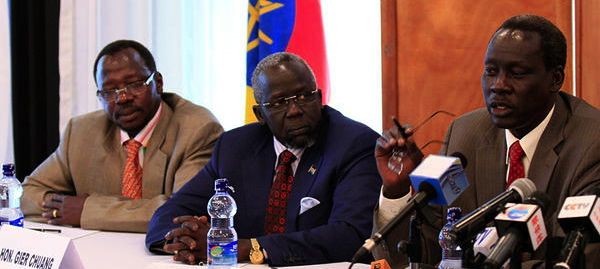Seven leaders of the SPLM who were released from detention by the South Sudanese president two weeks ago have joined the political talks in Ethiopia mediated by the East African regional bloc IGAD.
The seven leaders form a ‘third party’ to the talks since they have declined formally to join ranks with the opposition SPLM/A led by Riek Machar, the ousted vice president.
All are former high government officials including Cirino Hiteng, former minister of youth; Gier Chuang, former minister of interior, John Luk, former minister of justice; Kosti Manibe, former minister of finance; Madut Biar, former minister of telecommunications; Chol Tong, former governor of Lakes State; and Deng Alor, former minister of cabinet affairs.
Speaking after arriving from Nairobi on Wednesday night, the seven gave a press conference on Thursday. Below is the transcript of their official statement, as delivered by the group’s spokesman John Luk.
Full text, 13 February:
We the seven SPLM leaders, former political detainees, arrived at Addis Ababa yesterday evening from Nairobi, on the invitation of the IGAD Special Envoys, for us to participate in the second phase of the political talks on the South Sudan crisis. This invitation for our participation came as a result of the recognition by the IGAD Summit of Heads of State, the Government of South Sudan, and the SPLM/SPLA (in opposition), of positive contribution that the former detainees can play in the search for speedy resolution of the unfortunate conflict that has gripped the country since the 15th of December 2013.
This recognition was expressed in the communiqués of the IGAD Assembly of Heads of State on the 23rd and 24th Extraordinary Sessions of the 27th of December 2013 and the 31st January 201, two extraordinary sessions in which the heads of state of IGAD met and they issued communiqués recognizing the positive role that can be played by the 11 detainees. We are seven. Four are still in detention in Juba.
And this role was also recognized by the Government of the Republic of South Sudan, contained in the Agreement on the Status of Detainees of the 23rd January 2014. This morning we met the IGAD Special Envoys and exchanged views on the way forward and on matters connected with the agenda and programmes of the talks.
We greatly appreciate this invitation and commit ourselves to participate effectively and positively alongside other parties in finding peaceful and durable solution to the crisis in the country.
Deeply concerned about the immense suffering facing our people as a result of the on-going conflict manifested in the form of massive loss of lives of innocent people, displacement of hundreds of thousands into the bushes of South Sudan, and to the United Nations Camps and neighboring countries, we call upon the Government of South Sudan, the United Nations Organization and the international community at large to increase their humanitarian intervention – their efforts to help those that are in that dire situation – to save lives and to minimize the suffering of our people.
We further call upon IGAD and the international community to quickly put in place mechanisms for monitoring and verification of the cease-fire already agreed – or the cessation of hostilities, already agreed – so as to prevent violations and further escalation of the conflict.
As a country – we feel – the killing of people and continued fighting for control of territory is not the best way of addressing the current crisis. As parties concerned, we must focus on finding political settlement to the crisis by addressing comprehensively the underlying issues of the conflict.
Finally, we take this opportunity to call upon President Salva Kiir Mayardit to set free the remaining four detainees and also allow another colleague of ours Dr. Peter Adwok Nyaba to travel, so that all these people can participate and contribute to the efforts in finding a lasting solution to the crisis in our country during these peace talks.
We commend the ongoing efforts by the IGAD Heads of State and the Special Envoys to secure the release of the four detainees. There are efforts underway but those are now for the heads of state of IGAD and the special envoys. We further re-iterate and re-affirm our commitment to a peaceful settlement of this national crisis.
That is the reason why we are here and we are coming to attend these talks. We would like peace to return to our country. The suffering is too immense, that children are dying, women are dying and suffering, people are in the bushes, people are in the United Nations camps with barely anything to depend on, with no shelter.
Soon it will be the rainy season in South Sudan – almost starting in Equatoria region, and will also come to the Greater Upper Nile Region. If nothing is done and the rains come while they are still in those areas, it will be a big major, tragic humanitarian disaster. Because they will have nowhere to go.
So that is why these talks – this round of talks – people are putting a lot of hope that they must come out with a speedy resolution of the conflict. It should not be a protracted kind of struggle, because it is just one country, it is just one people that are divided by issues that we believe are resolvable.
This is the end of the press statement, ladies and gentlemen.
Photo: Cirino Hiteng, Gier Chuang, and Deng Alor Kuol, from left to right, 13 February 2014 (Tiksa Negeri/Reuters)




